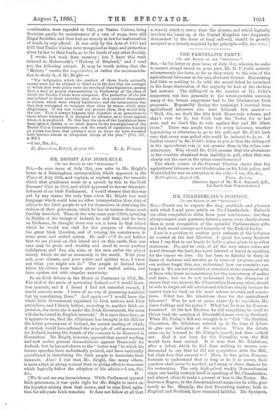MR. BRIGHT AND HOME-RULE.
[TO THE EDITOR OF THE "SPECTATOR.")
SIR,—In your issue of July 31st, you refer to Mr. Bright's 4etter to a Birmingham correspondent, which appeared in the Times of July 29th, and explain, or explain away, the remarks which that gentleman made in a speech by him to the Cork Farmers' Club in 1866, and which appeared to favour the estab- dishment of an Irish Parliament. I would observe that this was not by any means the only time when Mr. Bright has used language which could bear no other interpretation than that of advice to the Irish people to act for themselves in obtaining the -redress of their grievances, which he has at various times most forcibly described. Thus, in the very same year (1866), speaking in Dublin of the wrongs of Ireland, he said that, had he been an Irishman, he thought there was not a town in that island which he would not visit for the purpose of discussing the great Irish Question, and of rousing his countrymen to some great and united action. He said :—" I do not believe that we are placed on this island and on this earth, that one man may be great and wealthy and revel in every profuse .indulgence, and five, six, nine, or ten men stiffer the abject misery which we see so commonly in the world. With your soil, your climate, and your active and spirited race, I know not what you might not do." The people of Ireland have taken his advice, have taken great and united action, and have spoken out with singular unanimity.
In an Irish debate in the House of Commons in 1797, Mr. Fox said of the mode of governing Ireland :—" I would there- fore concede, and if I found I had not conceded enough, I -would concede more. I know of no way of governing mankind but by conciliating them." And again :—" I would have the whole Irish Government regulated by Irish notions and Irish prejudices, and I firmly believe, according to another Irish ex- pression, the more she is under the Irish Government, the more will she be bound to English interests." It is upon these lines, as it appears to me, that Mr. Gladstone has brought in his Bill for the better government of Ireland, the second reading of which, if carried, would have affirmed the principle of self-government for Ireland, leaving the details of the measure to be discussed in Committee. Mr. Bright, however, opposed that second reading, and now makes general denunciations against Home-rule for Ireland ; but he has not shown us the "better way" to which his former speeches have undoubtedly pointed, and have materially contributed in stimulating the Irish people to formulate their demands. Alas I feel that Mr. Bright, like many others, is more adept at givieg counsel than in giving effect to measures which logically follow the adoption of his advice.—I am, Sir, D.
[We do not see any inconsistency. While Parliament ignored Irish grievances, it was quite right for Mr. Bright to insist on -the injustice arising from that course, and to urge Irish agita- tion for adequate Irish remedies. It does not follow at all that
a remedy which is wore than the disease, and which logically involves the break-up of the United Kingdom into fragments determined by the force of local self-will, should be gravely accepted as a remedy required by his principle.—En. Spectator.]


































 Previous page
Previous page